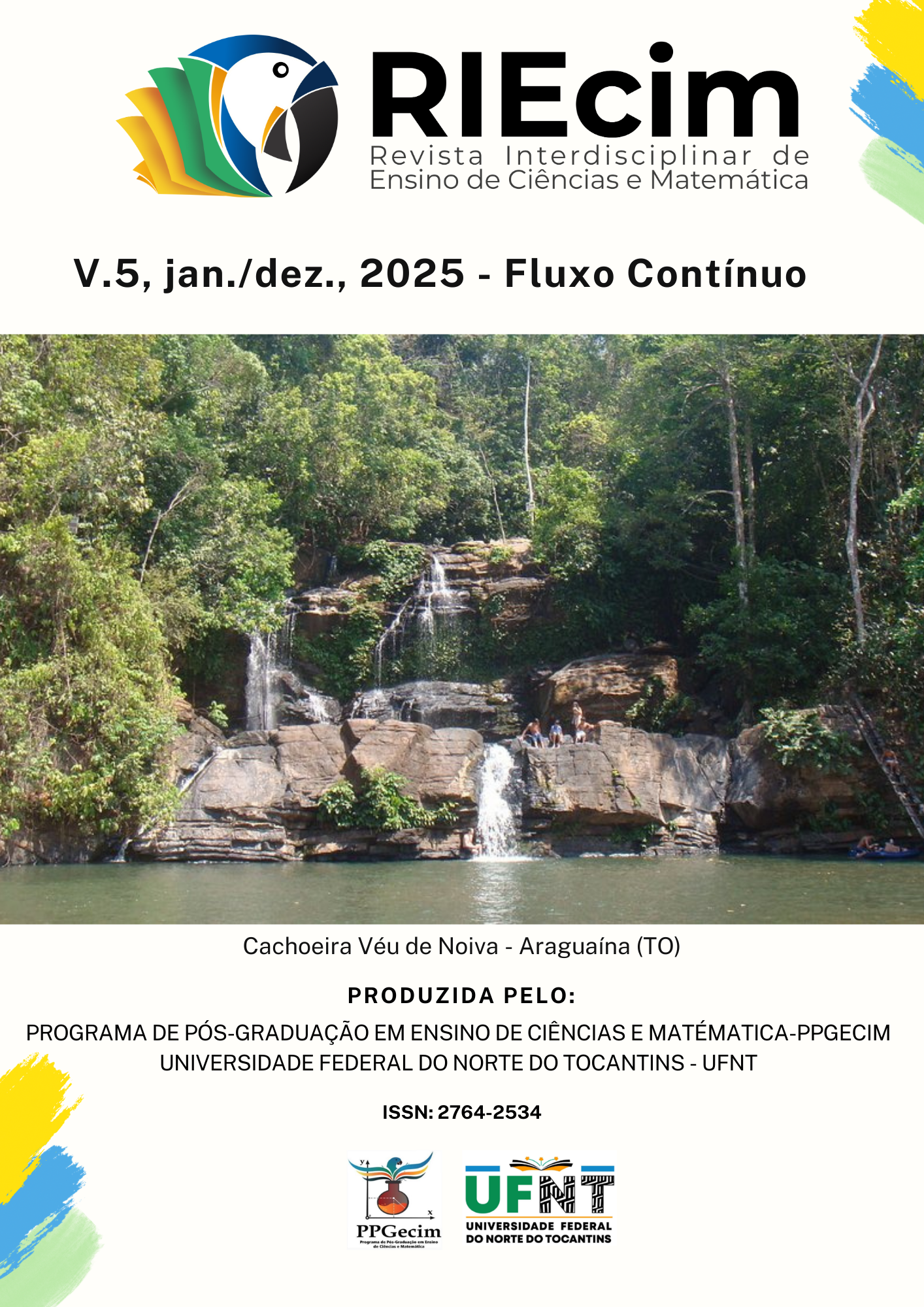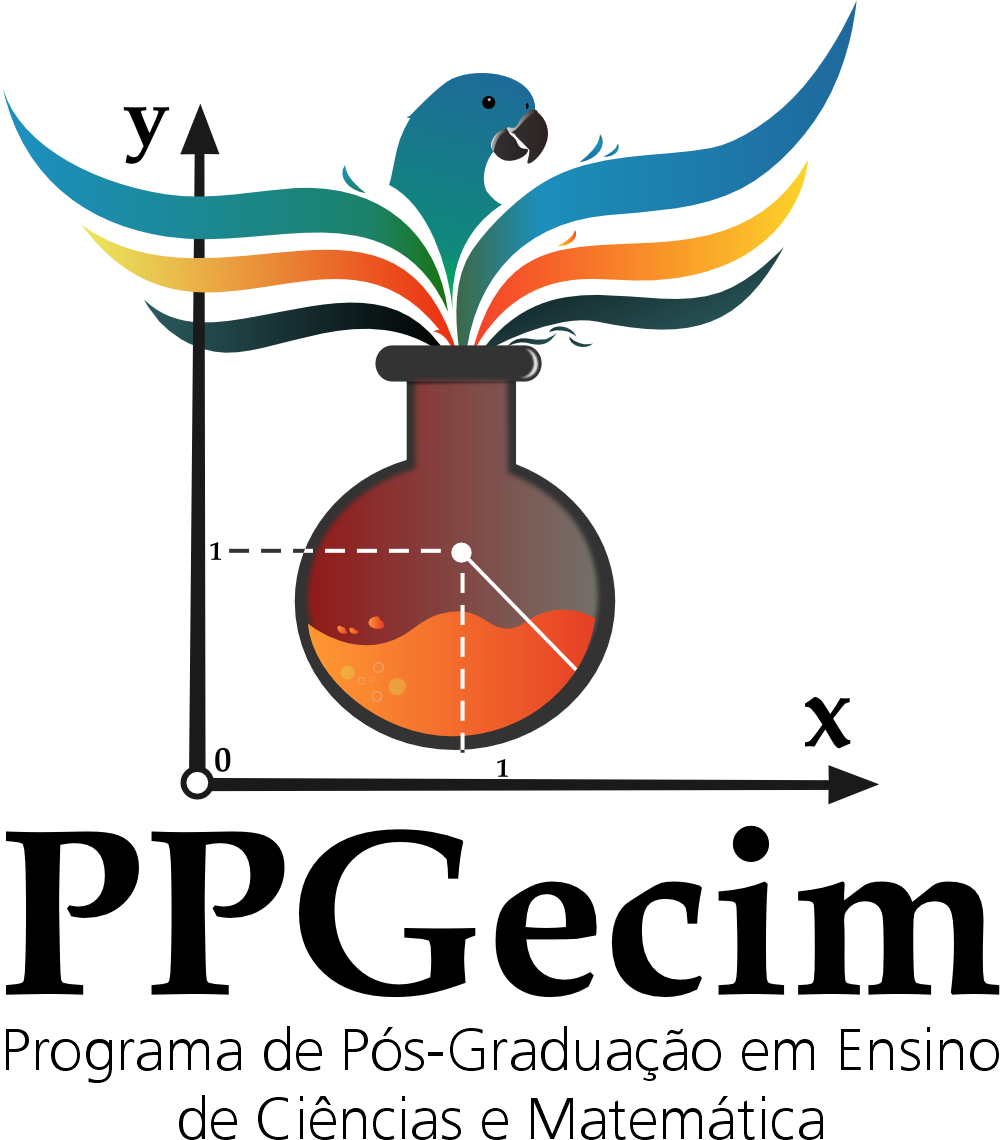TECNOLOGIA E ENSINO DE FÍSICA:
CRIAÇÃO E AVALIAÇÃO DE UM JOGO EDUCATIVO NO ENSINO DE ÓPTICA GEOMÉTRICA
DOI:
https://doi.org/10.70860/RIEcim.2764-2534.2025.v5.19996Palavras-chave:
Jogos educativos, Óptica geométrica, Ensino de Física, Recurso didáticoResumo
Este artigo apresenta a concepção, desenvolvimento e aplicação de um jogo educativo digital intitulado “Desafio da Óptica Geométrica”, desenvolvido em PowerPoint, como recurso didático para o ensino de conceitos fundamentais da óptica geométrica. A proposta visa promover a aprendizagem significativa por meio de uma abordagem lúdica, interativa e acessível, especialmente em contextos escolares da rede pública. A pesquisa, de natureza exploratória e qualitativa, foi aplicada a 30 estudantes e utilizou instrumentos avaliativos combinando dados quantitativos (escala de Likert adaptada) e qualitativos (análise de conteúdo). Os resultados indicam alto engajamento, melhoria na compreensão conceitual e boa receptividade dos alunos, além de sugestões de aprimoramento. A análise dos dados evidencia que o jogo contribui de forma eficaz para o ensino de Física, reforçando a importância da gamificação como estratégia pedagógica inovadora e inclusiva.
Referências
ANDRADE, Marcos Vinícius; PAZ, Fábio Soares da. O Ensino de Física no contexto do Novo Ensino Médio na Educação do Campo. Vitruvian Cogitationes, v. 5, n. 1, p. 31–48, 22 fev. 2024. DOI: https://doi.org/10.4025/rvc.v5i1.70598
BARDIN, L. Análise de conteúdo. São Paulo: Edições 70, 2011.
DETONI, Vanessa Souza Santos et al. A TRANSFORMAÇÃO DA EDUCAÇÃO E A INTEGRAÇÃO ENTRE TECNOLOGIA, METODOLOGIAS E CURRÍCULO. Revista Amor Mundi, v. 4, n. 10, p. 129–139, 22 dez. 2023. DOI: https://doi.org/10.46550/amormundi.v4i10.368
FIUZA, Deise Quiele Rauber et al. USO DE OBJETOS DE APRENDIZAGEM DIGITAL PARA FLEXIBILIZAR O CONHECIMENTO E POTENCIALIZAR A AUTONOMIA DO APRENDIZADO NO ENSINO DA EDUCAÇÃO AMBIENTAL. Revista Eletrônica em Gestão, Educação e Tecnologia Ambiental, v. 18, n. 1, 7 abr. 2014. DOI: https://doi.org/10.5902/2236117012752
GUI, Yang; CAI, Zhihui; YANG, Yajiao; et al. Effectiveness of digital educational game and game design in STEM learning: a meta-analytic review. International Journal of STEM Education, v. 10, n. 1, p. 36, 2023. Disponível em: <https://stemeducationjournal.springeropen.com/articles/10.1186/s40594-023-00424-9>. Acesso em: 16 jul. 2025. DOI: https://doi.org/10.1186/s40594-023-00424-9
GUTIÉRREZ, Rafale Enrique araujo; BRACHO, Luis Andrés castilho. Simuladores com o software GeoGebra como objetos de aprendizagem para o ensino da física. Tecné Episteme y Didaxis: TED, n. 47, 1 jan. 2020. DOI: https://doi.org/10.17227/ted.num47-11336
JARDINI, Juliana Brandão; SOUZA, Hilton marcelo de lima; MIRANDA, Anderson fernandes de. USO DO QUIZ COMO FERRAMENTA PARA O ENSINO E A APRENDIZAGEM SOBRE MITOSE. Revista Prática Docente, v. 8, n. 1, p. e23018, 2023. Disponível em: <http://periodicos.cfs.ifmt.edu.br/periodicos/index.php/rpd/article/view/163>. Acesso em: 16 jul. 2025. DOI: https://doi.org/10.23926/RPD.2023.v8.n1.e23018.id1438
JOSHI, Ankur; KALE, Saket; CHANDEL, Satish; et al. Likert Scale: Explored and Explained. British Journal of Applied Science & Technology, v. 7, n. 4, p. 396–403, 2015. Disponível em: <https://journalcjast.com/index.php/CJAST/article/view/381>. Acesso em: 16 jul. 2025. DOI: https://doi.org/10.9734/BJAST/2015/14975
LIU, Bo; WAN, Xinyue; LI, Xiaofang; et al. An Augmented Reality Serious Game for Children’s Optical Science Education: Randomized Controlled Trial. JMIR Serious Games, v. 12, p. e47807–e47807, 2024. Disponível em: <https://games.jmir.org/2024/1/e47807>. Acesso em: 16 jul. 2025. DOI: https://doi.org/10.2196/47807
MOREIRA, Marco Antonio. Aprendizagem ativa com significado. Revista Espaço Pedagógico, v. 29, n. 2, p. 405–416, 25 nov. 2022. DOI: https://doi.org/10.5335/rep.v29i2.13887
MOREIRA, Marco Antonio. Desafios no ensino da física. Revista Brasileira de Ensino de Física, v. 43, n. suppl 1, 2021. DOI: https://doi.org/10.1590/1806-9126-rbef-2020-0451
PAIVA, Luciene da Silva de. O Uso dos Recursos Tecnológicos e da EAD na Educação de Alunos do Ensino Médio: experiência no Povoado da Ilha da Marchantaria Iranduba–AM. Editora Dialética, 2024. DOI: https://doi.org/10.48021/978-65-270-3506-0
SANTOS, Adriano de Araújo. APRENDA : uma proposta personalizada para a apropriação de recursos digitais na construção de avaliações para aprendizagem em espaços híbridos do ensino médio da rede estadual de Pernambuco. 2025. Disponível em: <https://tede2.pucrs.br/tede2/handle/tede/11531>. Acesso em: 16 jul. 2025.
SASSERON, Lucia Helena; DUSCHL, Richard Allan. ENSINO DE CIÊNCIAS E AS PRÁTICAS EPISTÊMICAS: O PAPEL DO PROFESSOR E O ENGAJAMENTO DOS ESTUDANTES. Investigações em Ensino de Ciências, v. 21, n. 2, p. 52, 2016. Disponível em: <https://www.if.ufrgs.br/cref/ojs/index.php/ienci/article/view/19>. Acesso em: 16 jul. 2025. DOI: https://doi.org/10.22600/1518-8795.ienci2016v21n2p52
SILVA, Ivanderson Pereira da; MERCADO, Luis Paulo Leopoldo. Revisão sistemática de literatura acerca da experimentação virtual no ensino de Fí¬sica. Ensino & Pesquisa, v. 17, n. 1, 14 jan. 2019. DOI: https://doi.org/10.33871/23594381.2019.17.1.2381
SILVA, Ivanderson Pereira da; SILVA, Alberto Tarrago Marcantonio da. O TEMA “EXPERIMENTOS VIRTUAIS” NOS ANAIS DOS EVENTOS BRASILEIROS DE ENSINO DE FÍSICA (2005 – 2014). Revista de Ensino de Ciências e Matemática, v. 8, n. 1, p. 137–154, 7 abr. 2017.
SILVA, Ivanderson Pereira da; SILVA, Alberto Tarrago Marcantonio da. O TEMA “EXPERIMENTOS VIRTUAIS” NOS ANAIS DOS EVENTOS BRASILEIROS DE ENSINO DE FÍSICA (2005 – 2014). Revista de Ensino de Ciências e Matemática, v. 8, n. 1, p. 137–154, 7 abr. 2017. DOI: https://doi.org/10.26843/rencima.v8i1.1172
VALENTE, José Armando. Tecnologias na educação: potencializando aprendizagens. Campinas, SP: Papirus Editora, 2010.
VONKOVA, Hana; HRABAK, Jan. The (in) comparability of ICT knowledge and skill self-assessments among upper secondary school students: The use of the anchoring vignette method. Computers & Education, v. 85, p. 191–202, 2015. Disponível em: <https://linkinghub.elsevier.com/retrieve/pii/S036013151500072X>. Acesso em: 16 jul. 2025. DOI: https://doi.org/10.1016/j.compedu.2015.03.003
YAMAZAKI, Sérgio Choiti; YAMAZAKI, Regiani Magalhães de Oliveira. Jogos para o Ensino de Física, Química e Biologia: elaboração e utilização espontânea ou método teoricamente fundamentado? Revista Brasileira de Ensino de Ciência e Tecnologia, v. 7, n. 1, 15 maio 2014. DOI: https://doi.org/10.3895/S1982-873X2014000100009
Downloads
Publicado
Como Citar
Edição
Seção
Licença
Copyright (c) 2025 Alexandre Souza da Silva, Yolene Santos de Oliveira, Antonio Xavier Gil

Este trabalho está licenciado sob uma licença Creative Commons Attribution-NonCommercial 4.0 International License.
Política de Direitos autorais
Os direitos autorais são mantidos pelos autores, os quais concedem à RIEcim os direitos exclusivos de primeira publicação. Os autores não serão remunerados pela publicação de trabalhos neste periódico. Os autores têm autorização para assumir contratos adicionais separadamente, para distribuição não exclusiva da versão do trabalho publicada neste periódico (ex.: publicar em repositório institucional, em site pessoal, publicar uma tradução, ou como capítulo de livro), com reconhecimento de autoria e publicação inicial neste periódico. Os editores da Revista têm o direito de proceder a ajustes textuais e de adequação às normas da publicação.
Política de Acesso Aberto/Livre
Esta revista oferece acesso livre imediato ao seu conteúdo, seguindo o princípio de que disponibilizar gratuitamente o conhecimento científico ao público proporciona maior democratização mundial do conhecimento. Os usuários podem ler, baixar, copiar, distribuir, imprimir, pesquisar ou utilizá-los para qualquer finalidade legal, respeitando a legislação nacional dos direitos autorais e sem solicitar permissão prévia do editor ou do autor. As opiniões apresentadas nos artigos são de responsabilidade dos/das autores/autoras. A Revista não cobra Taxas de Processamento de Artigos (APCs – Article Processing Charges)
Política de licenciamento - licença de uso
Licenciado sob a Licença Creative Commons Attribution-NonCommercial 4.0 International (CC BY-NC 4.0). Esta licença permite compartilhar, copiar, redistribuir os manuscritos publicados na RIEcim em qualquer meio ou formato. Além disso, permite adaptar, remixar, transformar e construir sobre o material, desde que seja atribuído o devido crédito de autoria e publicação inicial neste periódico.

































